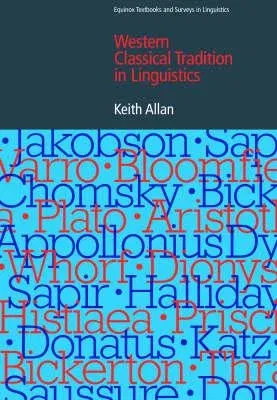Keith Allan
(Author)The Western Classical Tradition in LinguisticsHardcover, 1 February 2007

Qty
1
Turbo
Ships in 2 - 3 days
In Stock
Free Delivery
Cash on Delivery
15 Days
Free Returns
Secure Checkout

Part of Series
Equinox Textbooks and Surveys in Linguistics
Print Length
458 pages
Language
English
Publisher
Equinox Publishing
Date Published
1 Feb 2007
ISBN-10
1904768954
ISBN-13
9781904768951
Description
Product Details
Author:
Book Format:
Hardcover
Country of Origin:
US
Date Published:
1 February 2007
Dimensions:
25.91 x
18.03 x
2.54 cm
ISBN-10:
1904768954
ISBN-13:
9781904768951
Language:
English
Location:
Sheffield
Pages:
458
Publisher:
Weight:
816.47 gm